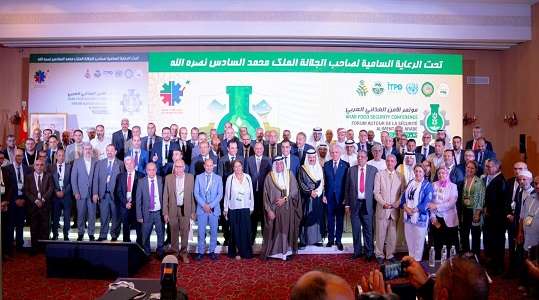The Arab Food Security Conference and Exhibition 2023 “Food industries and their role in achieving Arab food security”, which was held over the course of two days on October 2-3, was concluded under the patronage of the King of Morocco, Mohammed bin Hassan VI, in the city of Marrakesh - the Kingdom of Morocco. In the presence of the President delegate to the Prime Minister in charge of relations with Parliament and the official spokesman for the Moroccan government, Mustafa Paytas, the Minister of Industry and Trade in Morocco, Riad Mazouwar, the President of the Union of Arab Chambers, Samir Abdallah Nass, the President of the University of Moroccan Chambers of Commerce, Industry and Services, Hussein Aliwi, and the President of the Federation of Egyptian Chambers of Commerce, Ahmed. The agent, the head of the Union of Chambers of Commerce, Industry, and Agriculture in Libya, Muhammad Al-Rayid, and the Secretary-General of the Union of Arab Chambers, Dr. Khaled Hanafi, in addition to delegations from 13 Arab and foreign countries.
At the conclusion of the conference’s work, the conference attendees extended their thanks, appreciation, and praise to the Kingdom of Morocco, its king, government, and people, for the hospitality and hospitality, the distinguished organization, and the tremendous efforts that were made for the success of the conference and its holding on time, despite the tragic circumstances that befell the Kingdom of Morocco, especially the city of Marrakesh, as a result of the devastating earthquake that struck dear cities in brotherly Morocco.
The conferees extended their thanks and appreciation to the University of Moroccan Chambers of Industry, Commerce and Services in the person of its President, Mr. Hussein Alioui, to the executive body of the University of Chambers, and to the rest of the work team, for everything they have done to make this conference a notable success.
The conference attendees confirm, through the keenness of the private sector, Arab businessmen and investors, to hold this conference on time and place under the sublime patronage of His Majesty the King of Morocco Mohammed VI bin Hassan II Alaoui, may God protect him, that the will to live is stronger than the will to die, and to renew solidarity and stand with The brotherly Moroccan people, to overcome the ordeal that befell them, and to strive and work together hand in hand in order to start the construction and urbanization workshop and rise again.
The conference attendees stressed the importance of the role of governments in collaborating with the private sector in supporting Arab food security initiatives, through the following:
1- The existence of a clear political will, whether at the national level in all Arab countries or at the level of the entire Arab countries.
2- Countries, with their various bodies, must transform from the main operator to the organizer, supporter, and pavement of the way for the private sector.
3- The private sector has transformed from a viewer and spectator to an implementer and operator.
Based on the presentations made and the discussions that took place regarding them, the conference recommends the following:
First: It is necessary to activate the benefit of all initiatives and studies, many of which were presented at the conference, from all bodies affiliated with the League of Arab States and bodies specialized in the field of agriculture and initiatives that aim to increase the agricultural area at the level of the Arab world and achieve food security.
Second: It is necessary to facilitate the allocation of land, especially since in all Arab countries no more than 10% of the land is exploited, and there is no logic in delaying the allocation of these lands.
Third: There must be integration between Arab countries based on the relative advantages of each country, especially with the difference in soil, differences in seasons, and differences in water resources.
Fourth: It is necessary to remove all non-tariff obstacles to develop trade exchange, especially in the agricultural industry, and unify specifications.
Fifth: It is necessary to focus on scientific research and innovation, support agricultural entrepreneurs, and create cooperatives to bring together entrepreneurs, small and medium-sized companies, and agricultural excellence in the field of agriculture and food industries to maximize added value.
Sixth: Facilitating financing to obtain smart technology for agriculture and agricultural manufacturing.
Seventh: At the macro level, an organized labor market must be created, as the vocabulary of education in the Arab world has nothing to do with market needs, and there must be a link between actual needs and education outcomes.
Eighth: It is necessary to establish an Arab agricultural exchange to develop trade exchange in agricultural commodities between various Arab countries.
Ninth: It is necessary to develop supply chains, transportation, logistics, sorting, packing, and storage in every Arab country, and pay attention to the issue of specifications and standards for the benefit of supplying agricultural production to countries around the world, both Arab and international.
Tenth: Inviting companies concerned with agriculture and food industries to enter the “Arab Food Market” platform to benefit from broad partnerships with all Arab companies.
Eleventh: Benefiting from the experience of the Arab Bureau for Agricultural Entrepreneurs “Lebanon”.
The conference recommends submitting these recommendations to the Arab Summit, which will be held in the first quarter of 2024 in the Kingdom of Bahrain.
Source (Union of Arab Chambers)

